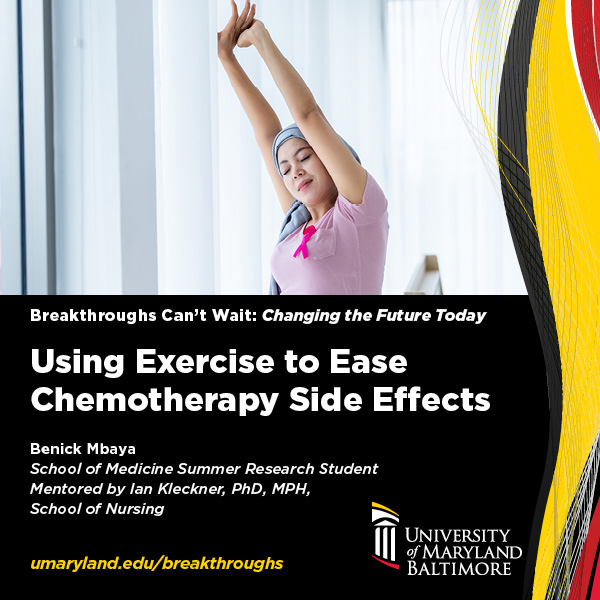Breakthroughs Can’t Wait: Can Exercise Help Breast Cancer Patients During Chemotherapy?
November 12, 2025 UMB Office of Communications and Public Affairs
As part of the Nathan Schnaper Intern Program in Translational Cancer Research at UMB, Benick Mbaya studied how exercise can improve symptoms for women undergoing chemotherapy for breast cancer.
At the University of Maryland, Baltimore (UMB), groundbreaking discoveries happen every day — transforming medicine, improving health, and shaping the future. From changing legal policy to pioneering treatments to cutting-edge scientific breakthroughs, UMB researchers are tackling real-world challenges and making a lasting impact on lives everywhere.
In our “Breakthroughs Can’t Wait: Changing the Future Today” series of videos, we will dive into inspiring stories of innovation from across UMB’s seven schools. See how scientists, doctors, and experts are addressing today’s most pressing issues — fueled by the critical support of government funding that drives progress forward.
As part of the Nathan Schnaper Intern Program in Translational Cancer Research at the University of Maryland, Baltimore, Benick Mbaya studied how exercise can improve symptoms for women undergoing chemotherapy for breast cancer.
“Chemotherapy-induced peripheral neuropathy is tingling in your hands and feet, and what we want to see is how that is changing across chemotherapy,” Mbaya said. “We want to look at the effects of exercise on physical function in women undergoing chemotherapy who have breast cancer.”
“The exercises we provide each of our patients are very simple resistance band exercises, which they can complete in the comfort of their own home,” he explained. “They also have Fitbit monitoring — so we can track their steps and have daily diaries where they can record their progress.”
Participants consistently shared positive feedback about their experience. Many said they would gladly take part in the study again or recommend it to others undergoing chemotherapy.
“When you think about the overall cost of cancer care, it’s over $100,000 per person,” he added. “If we can have a method which can improve symptoms and that’s easy to implement and cheap to teach, that I believe is overall good for the field of cancer care.”
Watch the video below as Mbaya discusses his work.